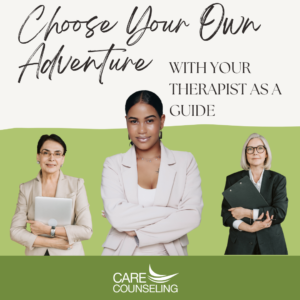Choose Your Own Adventure with Your Therapist as a Guide
 Choose Your Own Adventure (CYOA) books were very popular during the years 1979-1999, when they were first published as a new division of Bantam Books. The classic series of books consisted of 184 gamebooks, with 30 different writers as authors. The reader was in control of the narrative. You got to choose your own adventure. Along with decisions, came various feelings, depending on the consequences of the outcome.
Choose Your Own Adventure (CYOA) books were very popular during the years 1979-1999, when they were first published as a new division of Bantam Books. The classic series of books consisted of 184 gamebooks, with 30 different writers as authors. The reader was in control of the narrative. You got to choose your own adventure. Along with decisions, came various feelings, depending on the consequences of the outcome.
There are some interesting patterns found in the types of endings that were typical in choosing your own adventure.
Here are several possible consequences for the end of story:
- Highly desired resolutions
- Satisfactory outcomes (but not necessarily the desired outcome)
- Unsatisfactory outcomes (but not necessarily the worst outcome)
- Death to you, your companions, or both
- Similar to death, a state of being transformed and stuck in a non-human state
- Repetition of the same choices within the story, with restarting the adventure as the only option
How similar these outcomes resemble our personal narratives!
Think of a problem that you are currently encountering with a choice that needs to be made. Some common decisions typically involve career, school, or relationships such as changing careers, deciding what to do after high school, or ending a relationship.
If you are not encountering big decisions, consider small, daily choices such as getting up at the time your alarm is set or choosing to continue with a commitment you made to yourself.
What are your options? Try to narrow these down to your top three to explore further. This is where the support of a therapist can be helpful. They won’t make the decision for you but will guide you through decision making processes while working to address thoughts and feelings that come up. Your therapist can help empower you to make decisions that are in alignment with your values and goals while supporting you before, during, and after your adventure.
Explore how you might think and feel, given the possible outcomes on each adventure.
Identify the consequences. These can be positive, negative, or somewhat neutral.
Decide if this is a choice you would like to make.
Reflect and evaluate.
Real life is more complicated than simply closing a book and choosing a new adventure. You may already be living with the consequences of adventures made in your earlier years and sitting with those thoughts and feelings. Additionally, we may be experiencing the consequences of others’ decisions and need support in the next steps. You do not need to go through these situations alone. The good news is that every day is an opportunity for a new adventure and therapy is a resource available to help cope.
Written By: Charlotte Johnson, MA, LPCC



























